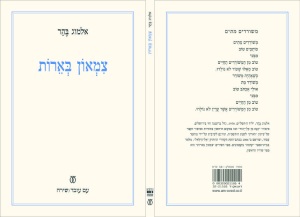1.
לפני שנתיים – בהרצאה ירושלמית חד-פעמית של זַ'אק דֵרִידָה, הוא יעקב דרעי יליד אלזִ'יר, שדיבר באִנְגְלִיזִית מצורפתת ומגורמנת על חוסר היכולת לַחצות את גבולות השפה, ועל התנגדות השיר לתרגומו אשר בו-זמנית גם קוראת לַקורא לבוא ולנסות את כוחו ולאמץ שפתיו ולשונו באי-האפשרות כבניסיון בראשית – קראתי בקובץ תרגומים מערבית לעברית שהתקין נַעִים עַרַיְידִי, יליד הכפר מְעַ'אר שבגליל, לשירי אַדוֹנִיס, הוא המשורר הלבנוני יליד דמשק עַלִי אַחְמַד סַעִיד אַסְבַּר.
2.
אדוניס המתורגם שר על הַעירום, אשר תמיד קודמות לו שלוש נקודות, העירום של ראשית-השיר החופר גבולות בתוך חולות היקום הנובל וחושף גופות מילים זרוקות בין הרי השירים הגוועים. האש של השירים, של אדוניס, אבדה במרחבי הזמן הקיים והלא-קיים, ושפתו התחלפה באחרת, מצומצמת, וצעדיו בעולם שמעבר להרי-הלבנון שוב לא היו צעדיו.
3.
דרידה, דובר הפּוֹסְט, נעלם פתע מן האולם הגדול שבראשי, וכשחזר היו בגרונו מילים קשות להטיח על אוזניי הקרועות, ומתוך שחידד את כאבו בחוסר רצונו לשאת-ולתת עם הקץ אמר כי כל מוות הוא מותו של העולם, לא של עולם אחד מרבים, אלא של העולם האחד כולו. והניצול מאותו מוות, הסביר, נידון לחיות לבדו את מות קרובו או רחוקו, נידון לשאת לבדו את העולם המת על גבו. ואז הוא קרא שיר שכתב פַּאוּל צֶלַאן, יליד טְשֶרְנוֹבִיץ' שבבּוֹקוֹבִינָה, פרובינציה-לשעבר של הממלכה ההאבסבורגית. הוא קרא את השיר בגרמנית, שפת מותו של צלאן, ואחר קרא את תרגומו לאנגלית. ואני התחלתי לכתוב את המילים הללו, הספק-שיר הזה.
4.
צלאן המתורגם שר על זמזומו של שטף כוכבים שחורים, אשר מחליקים הרחק ממנו ומן השמיים, מתרחקים ועדיין נשמעים. הוא שר על מצחו המבותר של הקורבן, האייל שהיה כפרתו של יצחק, ובין קרניו היבשות ואכולות-הזמן, ששוב אין בהן זעם או תשוקה לקרב, חקק את דמות-הצער. שום-איש, ידע צלאן, שום-איש בעולם אינו חף-מפשע, אף לא העולם-עצמו או השיר-עצמו או האיל שמנע את פשעו של אברהם. העולם-עצמו מת, הבין צלאן, או שהבין דרידה, או שהבנתי אני דרכו, ועתה עלי לשאת אותו כולו על גבי עד מותי שלי.
לשירים נוספים מתוך "צמאון בארות"
Four Comments on the Nakedness of the Poem-Source / Almog Behar
translated from Hebrew into English: ?
1.
Two years ago—during a one-off lecture in Jerusalem by Jacques Derrida, who is Jacob Deris, native of Algeria, who spoke in Francified and Germanized English about the inability of crossing the boundaries of language, and on the opposition of the poem to its being translated while simultaneously the reader is beckoned to try his strength and strain his lips and his tongue at an impossibility as great as an attempt at genesis—I read a collection of translations from Arabic to Hebrew by Naim Araidi, native of the village Ma'ar in the Galilee, who translated the poems of Adonis, the Lebanese poet, born in Damascus as Ali Ahmad Said Asbar.
2.
The translated Adonis writes of nakedness, which for him is always proceeded by three points, the nakedness of the poem-source, the digger of borders in the sand of the wizened universe, and the revealer of bodies of discarded words amongst the mountains of dying poems. The fire of the poems, of Adonis, is lost in the expanses of existent and non-existent time, and his language is replaced with other language, reduced, and his footsteps in the world beyond the mountains of Lebanon were no longer his.
3.
Derrida, the spokesperson of Post, disappeared suddenly from the great hall in my head, and when he returned he had in his throat harsh words to hurl against my torn ears, and as he sharpened his pain with his lack of willingness to negotiate with the end, he said that any death is the death of the whole world, not the death of one world among many, but of the whole world itself. And the survivor of that death, he explained, is condemned to living out the death of those close to him and far from him, condemned to carry the dead world alone on his back. And then he read a poem written by Paul Célan, who is Paul Antschel, native of Czernowitz which is in Bukovina, former province of the Hapsburg Empire. He read the poem in German, the language of Célan's death, and afterwards read its English translation. And I began to write down these words, this half-poem.
4.
The translated Célan writes of the humming of black stars' flux, sliding far from him and the sky, distancing themselves yet still heard. He writes of the dissected forehead of a sacrifice, the ram which was the atonement of Isaac, and how between its dry time-worn horns, that once again have no anger or desire for battle, the sorrow-image is engraved. No-body, Célan knew, no-body in the world is innocent, not the world-self or the poem-self or the ram which prevented Abraham's crime. The world-self is dead, Célan understood, or Derrida understood, or I understood its manner, and now it falls on me to carry its entirety on my back until my own death.
***
someone told me about this blog, "opening birds", that i don't know who writes, that has some translations of poems from "Wells' Thirst" two years ago.
if one of you know who is the translator, please let me know.

